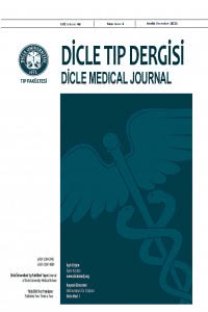Quality of Life and Self-Efficacy of Adolescents with Chronic Health Conditions
Kronik Sağlık Sorunu Bulunan Ergenlerin Yaşam Kalitesi ve Öz-Yeterliliği
___
- 1. Maslow GR, Chung RJ. Systematic review of positive youth development programs for adolescents with chronic illness. Pediatrics 2013;131:1605-18.
- 2. Berntsson L, Berg M, Brydolf M, Hellström A-L. Adolescents' experiences of well-being when living with a long-term illness or disability. Scand J Caring Sci. 2007;21:419-25.
- 3. Suris JC, Michaud PA, Viner R. The adolescent with a chronic condition. Part I: developmental issues. Arch Dis Child. 2004;89:938-42.
- 4. Taylor RM, Gibson F, Franck LS. A concept analysis of health-related quality of life in young people with chronic illness. J Clin Nurs. 2008;17:1823-33.
- 5. Eiser C, Morse R. A review of measures of quality of life for children with chronic illness. J Clin Nurs. 2001; 84:205-11.
- 6. Sawyer MG, Reynolds KE, Couper JJ, et al. Healthrelated quality of life of children and adolescents with chronic illness-a two year prospective study. Qual Life Res .2004; 13:1309-19.
- 7. Waters EB, Salmon LA, Wake M, et al. The health and well-being of adolescents: a school-based population study of the self-report Child Health Questionnaire. J Adolesc Health. 2001;29:140-9.
- 8. Huebner ES, Valois RF, Suldo SM, et al. Perceived quality of life: a neglected component of adolescent health assessment and intervention. T J Adolesc Healt. 2004; 34:270-8.
- 9. Bandura A. Social cognitive theory: an agentic perspective. Annu Rev Psychol. 2001;52:1-26.
- 10. Modi AC, Pai AL, Hommel KA, et al. Pediatric selfmanagement: a framework for research, practice, and policy. Pediatrics 2012;129:e473-e85.
- 11. Casier A, Goubert L, Gebhardt WA, et al. Acceptance, well-being and goals in adolescents with chronic illness: A daily process analysis. Psychol Health. 2013;28:1337-51.
- 12. Muris P. A brief questionnaire for measuring selfefficacy in youths. J Psychopathol Behav Assess.2001; 23:145-9.
- 13. Telef, B.B., Karaca, R. (2011). Ergenlerin ÖzYeterliklerinin ve Psikolojik Semptomlarının İncelenmesi. Mustafa Kemal Üniversitesi Sosyal Bilimler Enstitüsü Dergisi. 16:499-18.
- 14. Varni JW, Seid M, Rode CA. The PedsQL: measurement model for the pediatric quality of life inventory. Medical Care 1999; 37:126-39.
- 15. Memik NC, Ağaoğlu B, Coşkun A, ve ark. Çocuklar için yaşam kalitesi ölçeğinin 13-18 yaş ergen formunun geçerlik ve güvenilirliği. Türk Psikiyatri Dergisi 2007; 18:353-63.
- 16. Denny S, de Silva M, Fleming T, et al. The prevalence of chronic health conditions impacting on daily functioning and the association with emotional wellbeing among a national sample of high school students. J Adolesc Health. 2014; 54:410-5.
- 17. Erturan İ, Aktepe E, Balcı DD, et al. Atopik dermatitli ergenlerde benlik saygısı ve dermatolojik yaşam kalitesinin değerlendirilmesi. Türkderm. 2013; 47:39- 44.
- 18. Shaw KL, Southwood TR, Duffy CM, McDonagh JE. Health-related quality of life in adolescents with juvenile idiopathic arthritis. Arthritis And Rheumatism. 2006; 55:199-207.
- 19. Akyazı H, Baltacı D, Alpay K, Hocaoğlu Ç. Quality of life in adult patients with acne vulgaris before and after treatment. Dicle Medical Journal/Dicle Tıp Dergisi 2011; 38:282-8.
- 20. Durualp E, Kara FN, Yilmaz V, AlabeyoĞLu K. Kronik hastalığı olan ve olmayan çocukların ve ebeveynlerinin görüşlerine göre yaşam kalitelerinin karşılaştırılması. Ankara Üniversitesi Tıp Fakültesi Mecmuası 2010; 63:055-63.
- 21. Ladd GW. Peer relationships and social competence during early and middle childhood. Annu Rev Psychol. 1999; 50:333.
- 22. Zashikhina A, Hagglof B. Health-related quality of life in adolescents with chronic physical illness in northern Russia: a cross-sectional study. Health Qual Life Outcomes 2014; 12:12.
- 23. Erickson SR, Munzenberger PJ, Plante MJ, et al. Influence of sociodemographics on the health-related quality of life of pediatric patients with asthma and their caregivers. J Asthma. 2002; 39:107-17.
- 24. Yoon PW, Scheuner MT, Jorgensen C, Khoury MJ. Developing Family Healthware, a family history screening tool to prevent common chronic diseases. Prev Chronic Dis. 2009; 6(1) A33
- 25. Caprara GV, Steca P, Gerbino M, et al. Looking for adolescents' well-being: self-efficacy beliefs as determinants of positive thinking and happiness. Epidemiol Psichiatr Soc. 2006; 15:30-43.
- 26. Gupta G, Kumar S. Mental health in relation to emotional intelligence and self efficacy among college students. Journal of the Indian Academy of Applied Psychology 2010; 36:61-7.
- 27. Tong Y, Song S. A Study on General Self-Efficacy and Subjective Well-Being of Low SES-College Students in a Chinese University. Coll Stud J 2004; 38:637.
- 28. Iannotti RJ, Schneider S, Nansel TR, et al. Self-efficacy, outcome expectations, and diabetes self-management in adolescents with type 1 diabetes. J Dev Behav Pediatr. 2006; 27:98-105.
- 29. Littlefield CH, Craven JL, Rodin GM, et al. Relationship of self-efficacy and binging to adherence to diabetes regimen among adolescents. Diabetes Care 1992; 15:90-4.
- ISSN: 1300-2945
- Yayın Aralığı: 4
- Başlangıç: 1963
- Yayıncı: Cahfer GÜLOĞLU
Trombositten zengin Fibrinin periferik sinir iyileşmesi üzerindeki histopatolojik etkileri
Hasan METİNEREN, Turan Cihan DÜLGEROĞLU, Mehmet Hüseyin METİNEREN
Multiple Skleroz'lu Hastalarda Üst Ekstremite Ataksisinin Bilgisayar Analizi İle Değerlendirilmesi
FATMA ERDEO, KADRİYE ARMUTLU, ALİ ULVİ UCA, İBRAHİM YILDIZ
Son Bir Yıl İçindeki Nekrotizan Fasiitis Tanısı Alan Hastaların Değerlendirilmesi
İBRAHİM TAYFUN ŞAHİNER, MURAT KENDİRCİ, Mete DOLAPÇI
Seroprevalences of Hepatitis B and Hepatitis C among healthcare workers in Tire State Hospital
Gökçen BUDAK GÜRKÖK, Nalan GÜLENÇ, Elife ÖZKAN, Rıfat BÜLBÜL, Caner BARAN
Quality of Life and Self-Efficacy of Adolescents with Chronic Health Conditions
Demet TAŞ, EBRU ÖZTÜRK ÇOPUR, HANDE KONŞUK ÜNLÜ, ZEYNEP TÜZÜN, LÜTFİYE HİLAL ÖZCEBE
ŞEBNEM KADER, Pınar Gökçe REİS, MEHMET MUTLU, Yakup ASLAN, EROL ERDURAN, UĞUR YAZAR
Güneydoğu Anadolu Bölgesi'nde Rutin Hepatit B Aşı Programının Etkisi
TUNCER ÖZEKİNCİ, SELAHATTİN ATMACA, Nezahat AKPOLAT, Kadri GÜL
Tanseli GÖNLÜGÜR, UĞUR GÖNLÜGÜR
İleri Yaş Hastalarda Çimentolu ve Çimentosuz Hemiartroplasti Sonuçlarının Karşılaştırılması
Şehmuz KAYA, Hüseyin ÖZDEMİR, Abdullah Yalçın DABAK
Acute Abdomen Caused by Spontaneous Perforation of Hydatid Liver Cyst
Faik TATLI, Orhan GÖZENELİ, Yusuf YÜCEL, ALİ UZUNKÖY, Hüseyin Cahit YALÇIN, Yalçın OZGÖNÜL, Abuzer DİRİCAN
